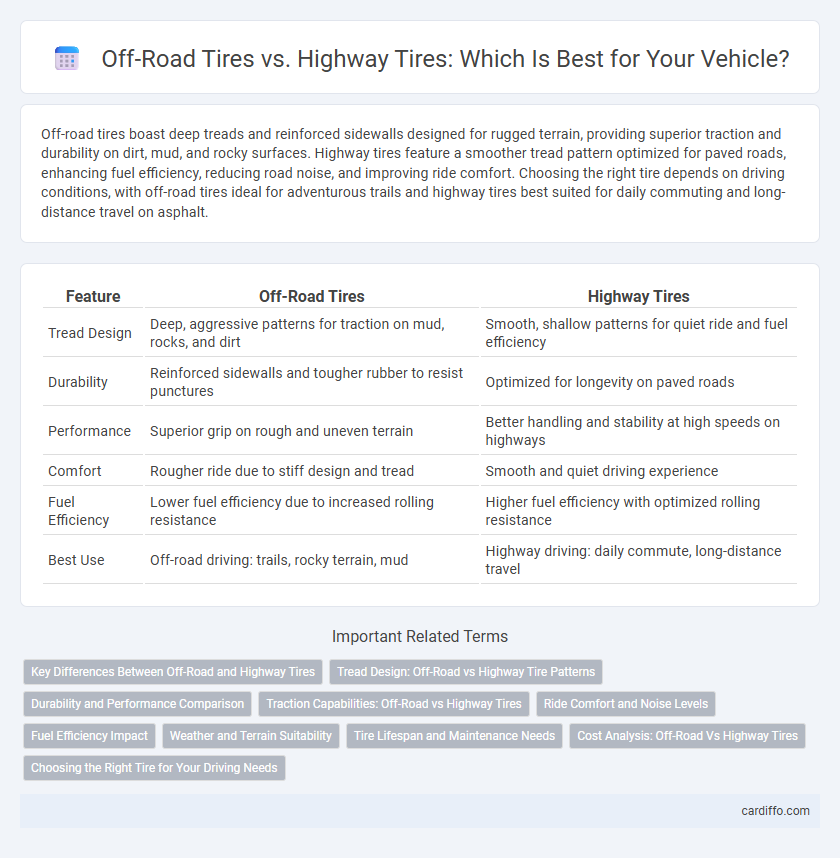Off-road tires boast deep treads and reinforced sidewalls designed for rugged terrain, providing superior traction and durability on dirt, mud, and rocky surfaces. Highway tires feature a smoother tread pattern optimized for paved roads, enhancing fuel efficiency, reducing road noise, and improving ride comfort. Choosing the right tire depends on driving conditions, with off-road tires ideal for adventurous trails and highway tires best suited for daily commuting and long-distance travel on asphalt.
Table of Comparison
| Feature | Off-Road Tires | Highway Tires |
|---|---|---|
| Tread Design | Deep, aggressive patterns for traction on mud, rocks, and dirt | Smooth, shallow patterns for quiet ride and fuel efficiency |
| Durability | Reinforced sidewalls and tougher rubber to resist punctures | Optimized for longevity on paved roads |
| Performance | Superior grip on rough and uneven terrain | Better handling and stability at high speeds on highways |
| Comfort | Rougher ride due to stiff design and tread | Smooth and quiet driving experience |
| Fuel Efficiency | Lower fuel efficiency due to increased rolling resistance | Higher fuel efficiency with optimized rolling resistance |
| Best Use | Off-road driving: trails, rocky terrain, mud | Highway driving: daily commute, long-distance travel |
Key Differences Between Off-Road and Highway Tires
Off-road tires feature deeper treads and reinforced sidewalls to enhance traction and durability on rugged terrains like mud, rocks, and sand. Highway tires prioritize smoother tread patterns and softer compounds for better fuel efficiency, quieter rides, and improved handling on paved surfaces. The key differences lie in tread design, material composition, and performance suitability tailored to either extreme off-road conditions or everyday highway driving.
Tread Design: Off-Road vs Highway Tire Patterns
Off-road tires feature aggressive, deep tread patterns with large voids designed to enhance traction on mud, rocks, and uneven terrain, maximizing grip and self-cleaning ability. Highway tires have shallower, closely spaced tread blocks optimized for smooth, quiet rides and efficient water dispersion on paved roads, improving fuel economy and reducing road noise. The contrasting designs reflect their primary functions: off-road tires prioritize durability and traction over rough surfaces, while highway tires focus on comfort and handling on asphalt.
Durability and Performance Comparison
Off-road tires feature reinforced sidewalls and aggressive tread patterns designed for maximum durability and traction on rough, uneven terrain, excelling in mud, rocks, and sand. Highway tires prioritize smooth performance, fuel efficiency, and reduced road noise with optimized tread compounds and shallower grooves suited for paved surfaces. Durability in off-road tires is higher under extreme conditions, while highway tires offer superior handling and longevity on asphalt.
Traction Capabilities: Off-Road vs Highway Tires
Off-road tires feature deep treads and aggressive patterns designed for maximum traction on loose, uneven terrains such as mud, rocks, and sand, enhancing grip in challenging environments. Highway tires offer smoother tread patterns optimized for pavement, providing superior traction on wet and dry roads with reduced road noise and increased fuel efficiency. The specialized traction capabilities of off-road tires make them essential for rugged outdoor driving, while highway tires prioritize stability and comfort on paved surfaces.
Ride Comfort and Noise Levels
Off-road tires feature aggressive tread patterns designed for traction on uneven terrain, often resulting in a rougher ride and higher noise levels on paved roads. Highway tires prioritize smoother tread designs that enhance ride comfort and minimize road noise during long-distance driving. Choosing the right tire depends on balancing terrain adaptability with the need for quiet, comfortable highway cruising.
Fuel Efficiency Impact
Off-road tires typically have deeper treads and more aggressive patterns, increasing rolling resistance and reducing fuel efficiency compared to highway tires. Highway tires are designed with smoother tread patterns and lighter compounds that minimize friction, enhancing fuel economy on paved surfaces. Choosing the appropriate tire type significantly influences fuel consumption, especially during long-distance or daily highway driving.
Weather and Terrain Suitability
Off-road tires feature deeper treads and reinforced sidewalls, providing superior traction and durability on rugged terrains like mud, rocks, and snow, making them ideal for wet and uneven conditions. Highway tires prioritize smoother tread patterns and optimized rubber compounds for enhanced grip and fuel efficiency on dry or wet paved roads, but they lack the toughness required for extreme off-road environments. Selecting the appropriate tire depends on the dominant weather conditions and terrain, with off-road tires excelling in harsh, variable weather and off-road terrains, while highway tires perform best in consistent, mild weather and paved surfaces.
Tire Lifespan and Maintenance Needs
Off-road tires typically have deeper treads and reinforced sidewalls that provide durability on rugged terrain but experience faster wear on paved roads, resulting in shorter lifespan compared to highway tires. Highway tires offer smoother rides, better fuel efficiency, and longer tread life due to their specialized rubber compounds and tread patterns designed for asphalt. Regular maintenance like tire rotation, proper inflation, and alignment is crucial for maximizing lifespan in both types, but off-road tires require more frequent inspections for cuts, punctures, and uneven wear caused by rough surfaces.
Cost Analysis: Off-Road Vs Highway Tires
Off-road tires typically cost between $150 and $300 per tire due to their reinforced construction and specialized tread designed for rugged terrains. Highway tires are generally more affordable, ranging from $80 to $150 per tire, optimized for durability and fuel efficiency on paved roads. Long-term cost considerations include faster wear on off-road tires when used on highways and potential fuel efficiency losses, making highway tires more economical for daily driving.
Choosing the Right Tire for Your Driving Needs
Off-road tires feature deeper treads and reinforced sidewalls to provide enhanced traction and durability on rough terrains, while highway tires prioritize smoother rides, fuel efficiency, and quiet performance on paved roads. Selecting the ideal tire depends on your primary driving environment--choose off-road tires for rugged trails and unpaved surfaces, or highway tires for daily commuting and long-distance travel on asphalt. Matching tire type to your driving needs ensures safety, extends tire life, and optimizes vehicle handling.
Off-Road Tires vs Highway Tires Infographic

 cardiffo.com
cardiffo.com